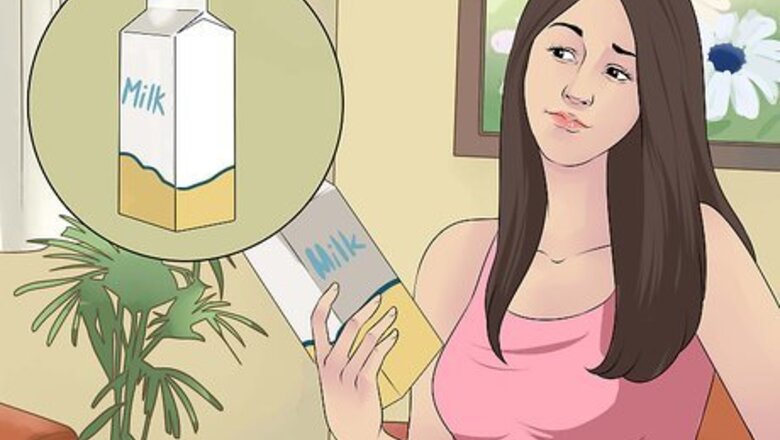
views
Mixing Your Conditioner
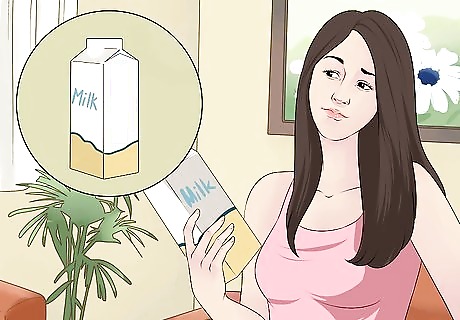
Decide which products you'd like to use for your conditioner. Milk conditioning can be used with just milk, but you can also use other items in your pantry for a natural hair mask to get beautiful, shiny hair. For regular milk conditioning, whole milk works best. You can use lowfat milk for fine hair, and cream for very coarse hair. Put it in a small spray bottle and spray over your hair, waiting 30 minutes before washing it out with shampoo.
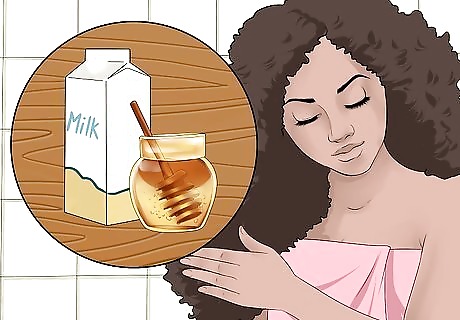
Add honey to your milk conditioner. Adding honey can seal moisture in your hair, and is a fan favorite for the combination conditioner. Milk-and-honey conditioner works great repairing damaged hair. Combine two cups of warm whole milk with two teaspoons of honey and stir until combined. Pour it over your hair and let it sit for 30 minutes.
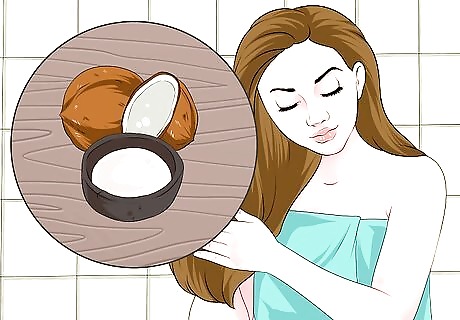
Use coconut milk instead of regular milk. Coconut milk can be used with essential oils to create a mask to fix dry hair. For this recipe, you may want to purchase essential oils to add to your mixture, if you desire. Refrigerate one can of unsweetened coconut milk overnight, before applying it to dry hair starting at the roots. Let it sit for 20 minutes before you rinse and comb the coconut milk out.
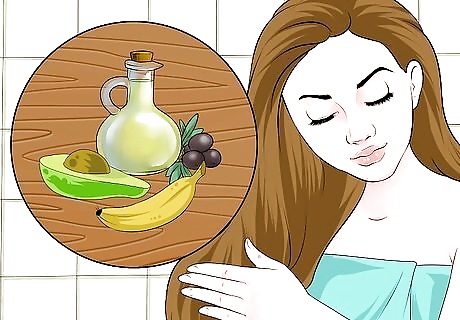
Try new fruits in your conditioners. When used properly, food and fruits can be used to create mixtures to treat your hair. Foods and fruits like bananas, avocados and olive oil can all be combined to treat dry, damaged and frizzy hair. Blend one banana with one tablespoon of your choice of olive oil, coconut oil or almond oil. Once the combination reaches a paste-like substance, you can apply it to your hair and leave it for 30 minutes before shampooing and conditioning as usual. Mash up a whole avocado with 1-2 teaspoons of olive oil and apply to all parts of your hair. Secure in a loose bun with a shower cap and leave it for 30 minutes, before rinsing in the shower with shampoo and conditioner.
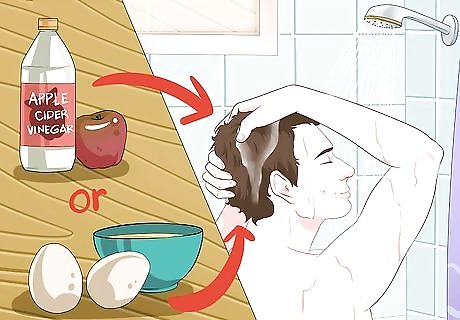
Create an all-natural shampoo. Since you're using milk conditioning for your hair, you may be interested in exchanging the harsh chemicals in your shampoo with all-natural ingredients as well. Eggs and apple cider vinegar are great options for mixing shampoos. Separate two egg yolks from their whites, and whisk the yolks before applying them to your hair. If you'd like to leave them in for several minutes, you can whisk the yolks with one tablespoon of mayonnaise for a pre-treating cream. Apple cider vinegar is a good tool to mix with water while you're in the shower to use in lieu of shampoo. You can use 1/2-1 tablespoon of apple cider vinegar with one cup of water, doubling these measurements to cover the length of your hair.
Conditioning In The Shower
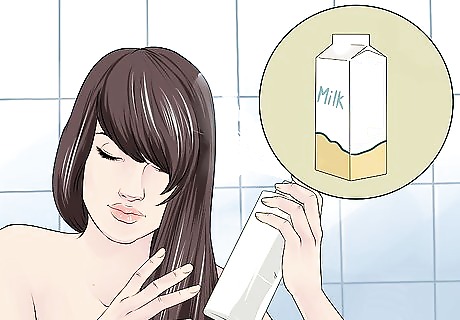
Apply milk thoroughly throughout your hair. Using the spray bottle, spray some milk evenly throughout your hair. If you'd like, you can use a brush to brush it through your hair, but you may need to spray some more. Try to use a clean brush and make sure to clean and remove any hairs after every use. Milk-hair in your brush will go bad quickly and easily develop bacteria that could get you sick.
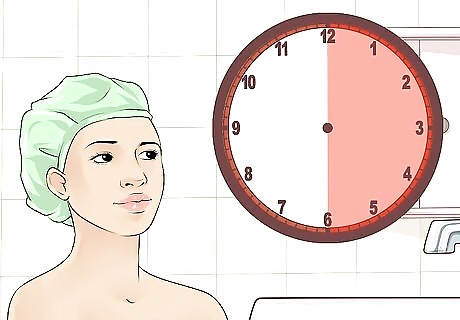
Wait at least 30 minutes. Allow your hair to absorb the milk for the best results. You should apply the milk product with plenty of time before your shower. For thicker and longer hair, you may want to wait longer than 30 minutes. Try not to let your hair sit for too long without washing. You don't want any accidental stickiness to develop in your hair.
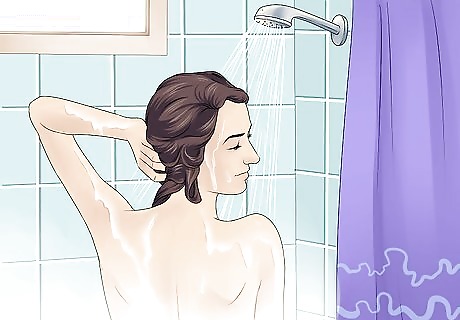
Take a shower. It's time to wash all that milk out of your hair. Prepare a shower as normal, with your towel ready for when you get out. Hot showers may be comfortable, but they could cause damage to the hair you're trying to strengthen and repair. Taking cold showers refines hair and skin, and if you're trying to use all-natural ingredients for your healthy hair, it can be a great addition to your hair care.
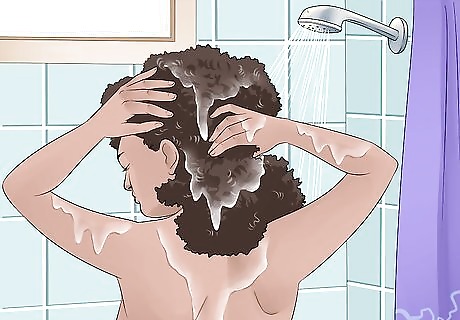
Wash your hair. Although it may seem scary to wash out the natural ingredients that you're using to strengthen and shine your hair, the truth is you have to wash out the milk and any the ingredients you may have used. The treatment set in your hair while you waited 30 minutes before showering, so if you don't wash it, you'll just end up with sticky, smelly hair. You can use other natural ingredients in lieu of shampoo. A beaten egg can be applied from your scalp through the length of your hair, and leave it in for a few minutes while you take the rest of your shower.
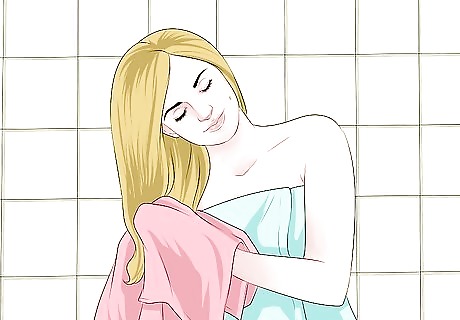
Towel dry your hair. Even if you style your hair while it's wet, you'll need to pat-dry the significant wetness in your hair. Make sure there are no droplets coming from the ends of your hair before you style or blow dry it. Blow-drying, straightening and curling your hair causes heat damage to your locks. Milk and honey can help repair this damage, but it still might not be a great idea to use these hair styling products every single day.
Securing Healthy Hair
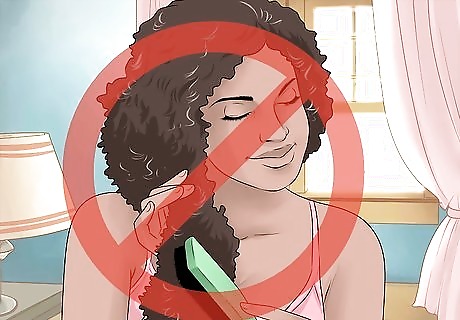
Style as usual. If you can, avoid styling with heat products. Heat can cause damage to your hair if you use it too much. Also avoid brushing wet hair. Wet hair is much more easily damaged than dry hair. Try using your fingers to remove tangles, as this may actually help strengthen your hair.
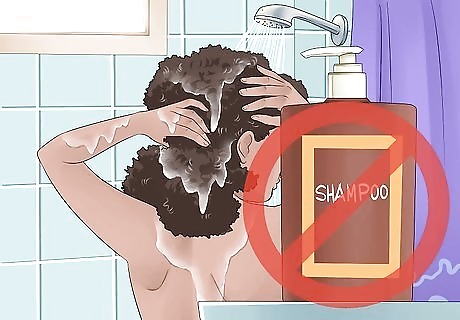
Do not use product on your hair daily. Your hair actually contains natural oils that are stripped when you wash them. When the oils pile up, your hair gets oily which is not desired. But stripping your hair of its natural oils every day is equally as harmful to your scalp. You should still clean your hair while you shower every day. Every now and then, you should bypass the shampooing process and focus on just water and friction from your hands, or solely conditioning.
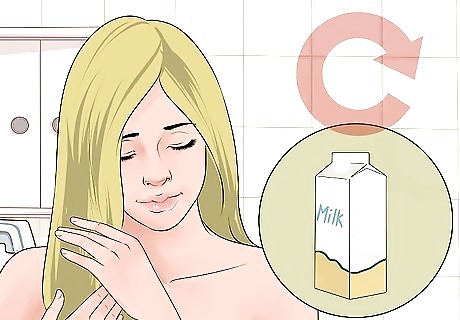
Continue using milk as a conditioner. Maintain your hair's new silky smoothness by continuing the milk-conditioning process consistently. This can repair your hair over time and leave your hair deep-conditioned for longer. There may be a time for a week or so after you stop using harsh chemical conditioner that your hair feels funky or oily. If you continue using milk conditioner, this transition period should go away.










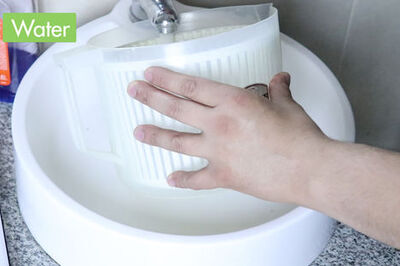

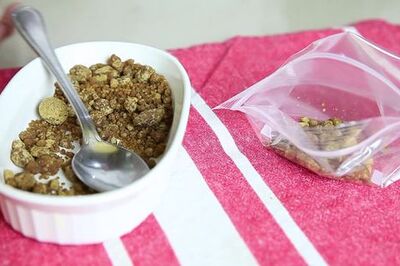



Comments
0 comment